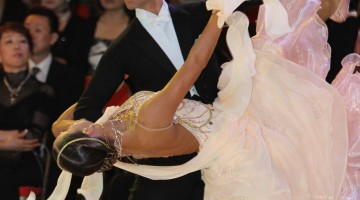When I was 19 I hired Bob Proctor from the hit movie The Secret to be my mentor and coach for over a year. This was around the same time I decided not to go to university but become a dancer and travel the world dancing.
It was a very ambitious goal, to decide to become a dancer, because at that age I had been dancing for about 1 year and had no predisposed dancing talent as my awesome coach said “he was a donkey when he started, the absolute worst in the class.” Got to love the honesty but I agree!
Sure I smiled a lot, but every dance I learned was so hard for me, if it wasn’t the choreography, it was keeping time, if it wasn’t the timing, it was leading.
Heck in my very first competition I did the wrong dance! I actually did the quickstep to the waltz music! You should of seen it, I had the biggest smile pumping out the quickstep choreography to the wrong music!
At least I thought to myself, it can only get better after that.
Thankfully, it did. My beautiful wife and I actually sat down and wrote out our 5 and 10 year goals together. Our ultimate goal was to become world professional 10 dance representatives in 10 years and along the way hit a series of other goals like, go from level 1 to open grade, then get a sponsor, then go to Blackpool, then get coached by worlds top coaches, then move to the uk etc all with dates on it.
My point is that you set the direction and limits for how high you want to go with your dancing.
Without a goal you have no compass to make the right decisions and you can’t work backward to set the necessary actions needed to hit it in place.
Most things you have been taught about goals are wrong. So let’s discuss that here.
Goals are not for things, they are what you collect along the way, but goals are for growth.
You do not set “smart” goals. Sure you need to be specific, measure them and put a time on them. But they do not and I repeat should not be realistic nor achievable.
That will annoy some people. But understand something about yourself.
There is zero inspiration in a realistic goal and the only person who can decide if a goal can be achieved is you, so the achievable aspect is not needed to be added in the equation. You’re either going to make it work or you’re not.
Goals are for growth and the person you become.
Another important point is you should not know how to hit your goal.
If you know the exact steps you need to take in order to achieve them the goal is too weak or small and the required changes you need to make basically won’t happen.
Goal setting is a logical process but achieving them is an emotional process.
Your goals need to be impressed into your subconscious mind and this is done through repetition. Or reading your goals daily and internalizing them by attaching emotion to them as if you have already achieved them…probably best avoid reading them aloud in the studio!
So with all these new concepts, how do you know if you have set the right goal?
Simple, if it scares and excites you at the same time, you’re spot on!
That’s because the new idea of making this goal happen is actually rubbing up against your emotional conditioning, or your current way of thinking and results. It will make you feel uncomfortable and that is a great thing.
That’s why if your goal is far to big it will flip over to the opposite and you won’t really get scared by it, so it needs to be big enough it scares you and just outside of your comfort zone enough you also get excited by the idea of hitting it.
Your present results reflect your present skill, mindset and paradigms about your dancing. Therefore if you want to increase those results you must set goals, that is why goals are for growth and the side benefit is the stuff you attract on the way.
I want you to use the following set of criteria for setting your dance goals this next year:
Present tense – you must set as if you have achieved. My mentor Bob Proctor always says start off your goal by saying I am so happy and grateful now that…
Firm date – everything you do today will be upto 12 months from now and include the day, date and year
Quantifiable – you need to be able to measure it.
Example: If you want to move up a grade or round you need to write that level down so you know if you hit it or not. Writing out you want to become a better dancer or want to make another level is not clear enough.
Keep positive words, No negatives at all! “No longer a bad dancer” is not good! Words like bad and lose etc are not words you want to use
Comfort zone crushing – here is where it gets tricky. You can’t set goals that are too far out of your present results otherwise they will become demotivating rather than inspiring goals. For example. Saying you want to become world champion in 12 months when you are in level 1 is too much of a stretch, that is a longer term goal. Here is where people get confused with the word realistic, you do not want to be realistic, the goal MUST stretch you.
Emotional, your goals must inspire you and scare you!
They have to be emotionally based. Example: I am so happy and grateful now that I am a open grade Latin finalist dancing my routines with ease, perfect posture and balance.
Or I am so happy and grateful I am now partnering a wonderful man/lady in my first medal exam and passed with flying colours.
Complete the following areas: business, finance, family, relationships, lifestyle, spirituality, health.
List only 3-6 goals per areas, but make them awesome
Print and laminate and place around your home and work and read daily. You can also put on the phone, tablet, smart TV screen saver or computer background.
Enjoy this process and make sure you don’t share with anyone, unless you can be assured they willow say ONE single negative thing about any goal you set. Your goals are also good to share with your coach to help you.
In tomorrow’s blog I will share with you the next stage in helping make these goals become real and it’s focused on coaching and accountability. Which is where the real exciting stuff starts to happen for you.




Leave a Reply